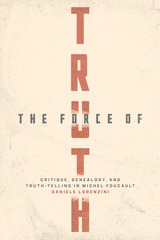
Many blame Michel Foucault for our post-truth and conspiracy-laden society. In this provocative work, Daniele Lorenzini argues that such criticism fundamentally misunderstands the philosopher’s project. Foucault did not question truth itself but what Lorenzini calls “the force of truth,” or how some truth claims are given the power to govern our conduct while others are not. This interest, Lorenzini shows, drove Foucault to articulate a new ethics and politics of truth-telling precisely in order to evade the threat of relativism. The Force of Truth explores this neglected dimension of Foucault’s project by putting his writings on regimes of truth and parrhesia in conversation with early analytic philosophy and by drawing out the “possibilizing” elements of Foucault’s genealogies that remain vital for practicing critique today.

A groundbreaking collection of writings by Michel Foucault and the Prisons Information Group documenting their efforts to expose France’s inhumane treatment of prisoners
Founded by Michel Foucault and others in 1970–71, the Prisons Information Group (GIP) circulated information about the inhumane conditions within the French prison system. Intolerable makes available for the first time in English a fully annotated compilation of materials produced by the GIP during its brief but influential existence, including an exclusive new interview with GIP member Hélène Cixous and writings by Gilles Deleuze and Jean Genet.
These archival documents—public announcements, manifestos, reports, pamphlets, interventions, press conference statements, interviews, and round table discussions—trace the GIP’s establishment in post-1968 political turmoil, the new models of social activism it pioneered, the prison revolts it supported across France, and the retrospective assessments that followed its denouement. At the same time, Intolerable offers a rich, concrete exploration of Foucault’s concept of resistance, providing a new understanding of the arc of his intellectual development and the genesis of his most influential book, Discipline and Punish.
Presenting the account of France’s most vibrant prison resistance movement in its own words and on its own terms, this significant and relevant collection also connects the approach and activities of the GIP to radical prison resistance movements today.
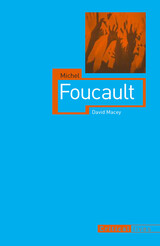
There is no better thinker than Foucault with which to begin the "Critical Lives" series. Though reticent about his personal life for most of his career, Foucault, in the last years of his life, changed his stance on the relationship between the personal and the intellectual and began to speak of an "aesthetics of existence" in which "the life" and "the work" become one. David Macey, a renowned expert on Foucault, demonstrates that these contradictions make it possible to relate Foucault's work to his life in an original and exciting way. Exploring the complex intellectual and political world in which Foucault lived and worked, and how that world is reflected in his seminal works, Macey paints a portrait of Foucault in which the thinker emerges as a brilliant strategist, one who-while fiercely promoting himself as a maverick-aligned himself with particular intellectual camps at precisely the right moments.
Michel Foucault traces the philosopher's career from his comfortable provincial
background to the pinnacle of the French academic system, paying careful attention to
the networks of friendships and the relations of power that sustained Foucault's
prominence in the academy. In an interview in 1966, Foucault said, "One ought to read
everything, study everything. In other words, one must have at one's disposal the general
archive of a period at a given moment." It is precisely this archive that Macey restores
here, accessibly relating Foucault's works to the particular context in which they were
given form.
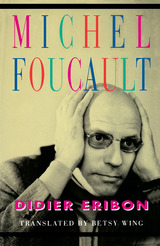
At the time of his death in 1984, at the age of fifty-eight, Michel Foucault was widely regarded as one of the most powerful minds of this century. Hailed by distinguished historians and lionized on his frequent visits to America, he continues to provoke lively debate. The nature and merits of his accomplishments remain tangled in controversy. Rejecting traditional liberal and Marxist "dreams of solidarity," Foucault became the very model of the modern intellectual, replacing Sartre as the figure of the eminent Parisian and cosmopolitan master thinker.
Foucault himself discouraged biographical questions, claiming that he was "not at all interesting." Didier Eribon's captivating account overthrows that assertion. As a journalist well acquainted with Foucault for years before his death, Eribon was particularly well placed to conduct the dozens of interviews which are the cornerstone of this book. He has drawn upon eyewitness accounts by Foucault's closest associates from all phases of his life--his mother, his schoolteachers, his classmates, his friends and enemies in academic life, and his celebrated companions in political activism, including Simone Signoret and Yves Montand. Eribon has methodically retraced the footsteps of his peripatetic subject, from France to Sweden to Poland to Germany to Tunisia to Brazil to Japan to the United States. The result is a concise, crisply readable, meticulously documented narrative that debunks the many myths and rumors surrounding the brilliant philosophe--and forces us to consider seriously the idea that all his books are indeed, just as Foucault said near the end of his life, "fragments of an autobiography."
Who was this man, Michel Foucault? In the late 1950s Foucault emerged as a budding young cultural attaché, friendly with Gaullist diplomats. By the mid-1960s he appeared as one of the avatars of structuralism, positioning himself as a new star in the fashionable world of French thought. A few months after the May 1968 student revolt, with Gaullism apparently shaken, he emerged as an ultra-leftist and a fellow traveler of Maoists. Yet during this same period, Eribon shows, he was quietly and adroitly campaigning for a chair in the College de France--the very pinnacle of the French academic system. This book does more than follow the career of one extraordinary intellectual. It reconstructs the cultural, political, and intellectual life of France from the postwar years to the present. It is the story of a man and his time.
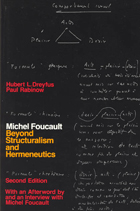
To demonstrate the sense in which Foucault's work is beyond structuralism and hermeneutics, the authors unfold a careful, analytical exposition of his oeuvre. They argue that during the of Foucault's work became a sustained and largely successful effort to develop a new method—"interpretative analytics"—capable fo explaining both the logic of structuralism's claim to be an objective science and the apparent validity of the hermeneutical counterclaim that the human sciences can proceed only by understanding the deepest meaning of the subject and his tradition.
"There are many new secondary sources [on Foucault]. None surpass the book by Hubert Dreyfus and Paul Rabinow. . . . The American paperback edition contains Foucault's 'On the Genealogy of Ethics,' a lucid interview that is now our best source for seeing how he construed the whole project of the history of sexuality."—David Hoy, London Review of Books

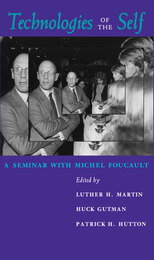
In many ways, Foucault's project on the self was the logical conclusion to his historical inquiry over twenty-five years into insanity, deviancy, criminality, and sexuality. Because Foucault died before he completed the revisions of his seminar presentations, this volume includes a careful transcription instead...as a prolegomenon to that unfinished task.
Foucault was a French philosopher, historian of ideas, social theorist, philologist and literary critic.
This volume was edited by Luther H. Martin, Huck Gutman, and Patrick H. Hutton.
READERS
Browse our collection.
PUBLISHERS
See BiblioVault's publisher services.
STUDENT SERVICES
Files for college accessibility offices.
UChicago Accessibility Resources
home | accessibility | search | about | contact us
BiblioVault ® 2001 - 2025
The University of Chicago Press









